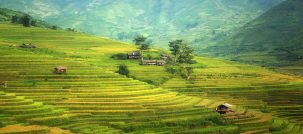Agriculture6
-

Lorenzo Cotula and Thierry Berger On Transparency around Land Investment Contracts
The Columbia Center on Sustainable Investment (CCSI) spoke with Lorenzo Cotula and Thierry Berger about OpenLandContracts.org, the challenges and opportunities stakeholders face in promoting greater transparency around land investments, and how effective use of disclosed information can be promoted.
-

Not So Sweet: Tanzania Confronts Arbitration over Large-Scale Sugarcane and Ethanol Project
The legal battle underscores the challenges that arise when governments, international investors, and the rights of local communities are at odds.
-

Cleaning Up New York City’s Waters and Beyond: Q&A with Kartik Chandran
Kartik Chandran, an environmental engineer at Columbia, will discuss some of his urban wastewater treatment projects at a panel discussion Friday following the screening of a new film about Rio de Janeiro’s Guanabara Bay.
-

Building Regenerative Local Food Systems
On April 27, 2017, the Earth Institute, the School of International and Public Affairs, the Agriculture and Food Security Center and the Columbia Water Center presented the third annual Forum on Sustainable Agriculture, on Building Regenerative Food Systems.
-

Students Compete in Food Security Simulation
How do multiple stakeholders compromise their competing needs and develop a global coordinated strategy that is politically palatable, possible and comprehensive enough to have an impact? Students from universities all over the U.S. Northeast gathered at Columbia for the 2017 NASPAA-Batten Student Simulation Competition that challenged students to do just this.
-

Beyond the Classroom: Field Visit to Rockefeller State Park
As part of the course on The Business and Ecology of Sustainable Forestry with Professor Ralph Schmidt, students visited the Rockefeller State Park in October 2016.
-

Water Quality Concerns Extend Well Beyond Flint
Researchers at the Columbia Water Center have been analyzing trends in drinking water quality violations. A critical lesson is that water quality violations extend well beyond the problem of lead in Flint’s drinking water.
-

Executive Training on Sustainable Investments in Agriculture
The Columbia Center on Sustainable Investment’s annual Executive Training Program on Sustainable Investments in Agriculture will be held at Columbia University in New York City from July 12-21, 2017. Applications will be accepted on a rolling basis until March 31, 2017.
-

Mapping Risks and Building Resilience, from Plot to Plate
Michael Puma, an associate research scientist at the NASA Goddard Institute for Space Studies and a Center for Climate and Life Fellow, works to improve understanding of the fragility of the global food system and how it might respond to major disruptions.

By studying thousands of buildings and analyzing their electricity use, Columbia Climate School Dean Alexis Abramson has been able to uncover ways to significantly cut energy consumption and emissions. Watch the Video: “Engineering a Cooler Future Through Smarter Buildings“
